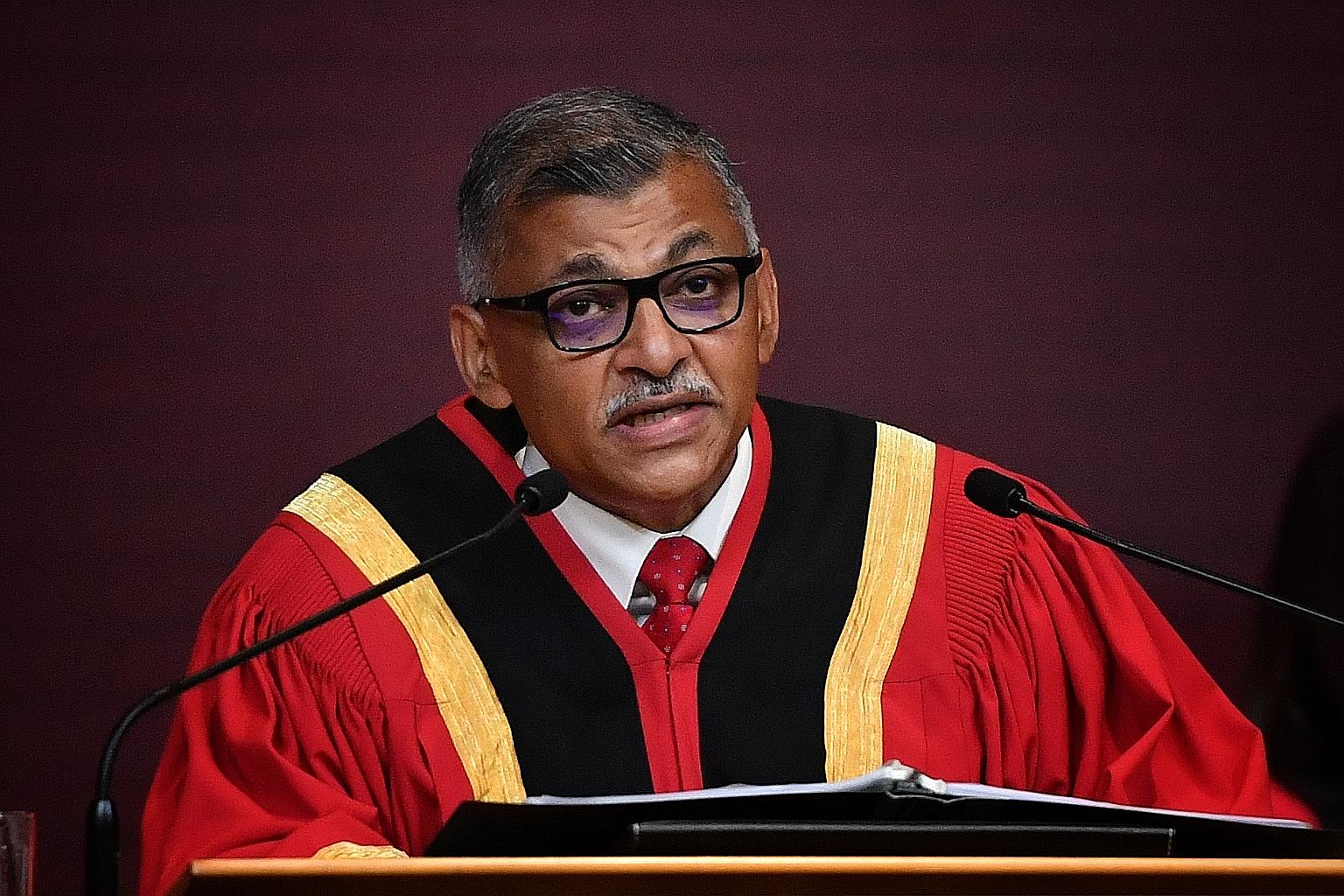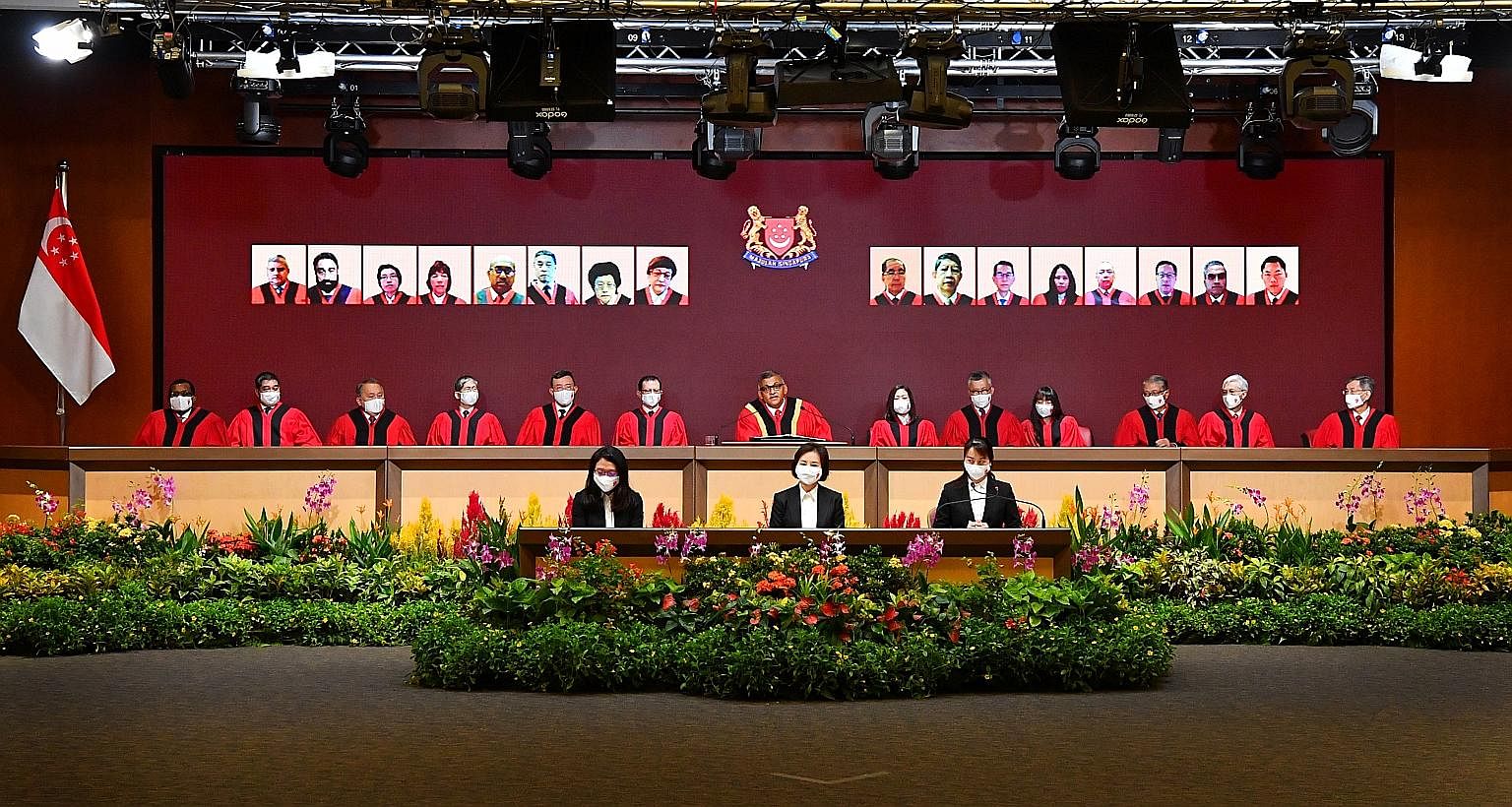Judges not infallible, but corrective systems in place: CJ
These work well to set right what might have initially gone amiss
Sign up now: Get ST's newsletters delivered to your inbox

CHIEF JUSTICE SUNDARESH MENON
Follow topic:
Chief Justice Sundaresh Menon, in giving his first comments on the high-profile Parti Liyani case, said yesterday that a sound system of justice begins with the selection of judges - but they are not infallible.
However, corrective procedures such as appeals are in place - and work well - to set right what might have initially gone amiss, he said in his speech to mark the opening of the legal year.
The annual event was conducted via video conference for the first time.
Chief Justice Menon, Attorney-General Lucien Wong and Law Society president Gregory Vijayendran delivered their customary speeches from the State Courts' Havelock Hall, with the proceedings live-streamed to about 1,000 participants.
The case of Ms Parti, a former domestic worker who was accused of stealing from the family of her employer, was mentioned by all three speakers.
Ms Parti was initially convicted by a State Courts judge following a trial, but last September, High Court judge Chan Seng Onn allowed her appeal and acquitted her. The case sparked public outcry, which led to a marathon nine-hour parliamentary debate over the fairness of the criminal justice system.
In his speech, the Chief Justice said the quest for a sound system of justice begins with the selection of judges with the appropriate temperament, ability, and integrity and commitment to carry out their heavy responsibilities.
Even so, judges are not infallible.
"That is precisely why virtually all judicial structures in the world incorporate a system of corrective procedures such as appeals, so that where something might have gone amiss at first instance, there is the opportunity to set it right," he said.
"Justice Chan Seng Onn was confronted with that responsibility in Ms Parti Liyani's case. He carefully scrutinised the evidence that had been led, the arguments that were advanced before him and the judgment of the trial court, and arrived at his decision for reasons that he explained in considerable detail."
However, the Chief Justice added that "we must constantly look beyond the fact that we have corrective court procedures that work well". Thus, the judiciary has also been working on enhancing training and development programmes for judges and judicial officers in recent years.
The Singapore Judicial College, which was founded in 2015, is now an integral part of the judiciary, running a growing calendar of programmes and developing a competency framework to enhance training of judicial officers.
Judicial officers in the State Courts and Family Justice Courts will also have more opportunities to be mentored by High Court judges, he said.
The Chief Justice stressed: "Judges and prosecutors serve no commercial interest. The only interest they serve is to do right by the law."
He said the State Courts, which serve as the gateway to the justice system for most litigants in Singapore, have done outstanding work over the years.
Giving a sense of their workload, he said that in 2019, close to 110,000 cases from the criminal justice, civil justice, and community justice and tribunals divisions were attended to by 91 judicial officers.
In the most recent survey of court users, all the respondents agreed that the State Courts administer justice fairly regardless of race, language or religion, while 99 per cent agreed that the State Courts dispense justice independently according to the law.

Chief Justice Sundaresh Menon (centre) delivering a speech to mark the opening of the legal year. The event was conducted virtually for the first time, with the proceedings live-streamed to about 1,000 participants.
ST PHOTO: CHONG JUN LIANG
"We may harbour strong views about a given case, but when all is said and done, it goes without saying that we must respect the final judicial outcome because, whether or not one agrees with a decision, the process that culminates in it affords us the best means we have for resolving our differences in a way that is fair, honest and conduces to orderly relations."
The Chief Justice added that it was "unhelpful" and "antithetical to due process" to prematurely condemn errors in the judicial process as suggestive of bad faith or impropriety.
"Where there is reason to think that there might have been misconduct, steps will be taken in accordance with the applicable processes, and these must be allowed to take their course."
In his speech, the Chief Justice also detailed the judiciary's response to the pandemic and his views on the post-pandemic legal landscape.
He said: "The pace with which the courts and the profession successfully pivoted to remote hearings demonstrates that we can leverage technology to optimise our processes."
However, he stressed the necessity of remaining sensitive to the needs of those who are less technologically equipped.
The economic impact of the pandemic also accentuates the need for a shift towards "peace building" alternative dispute resolution processes, he said.

